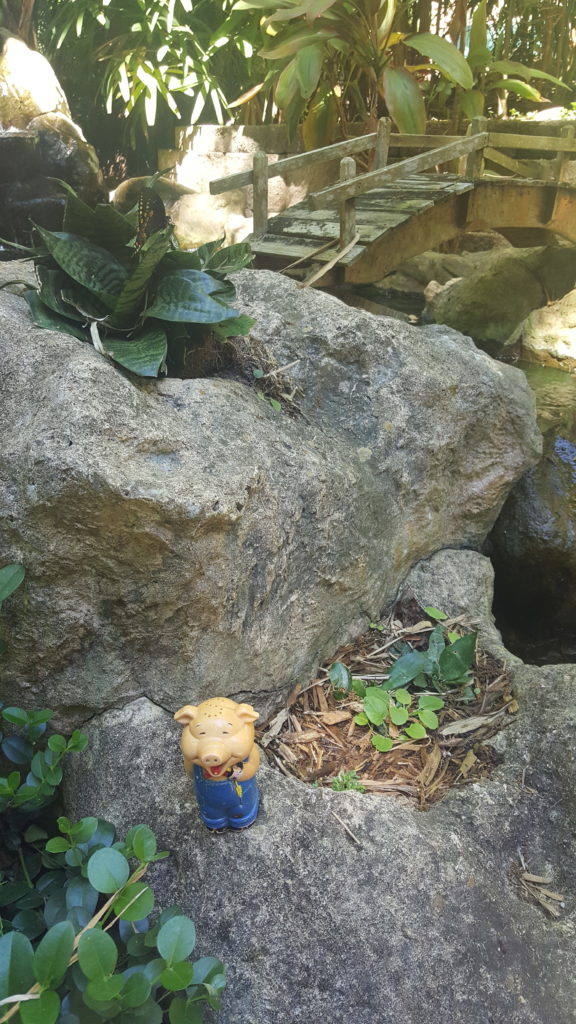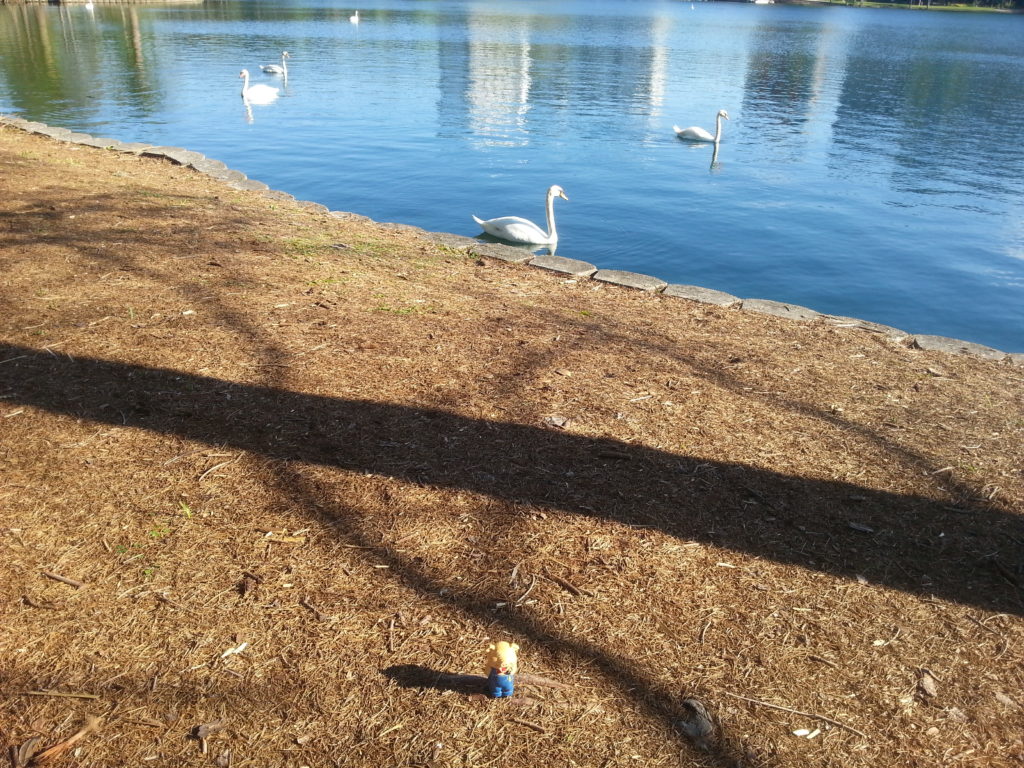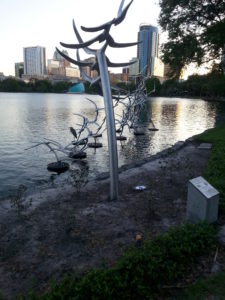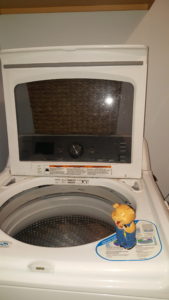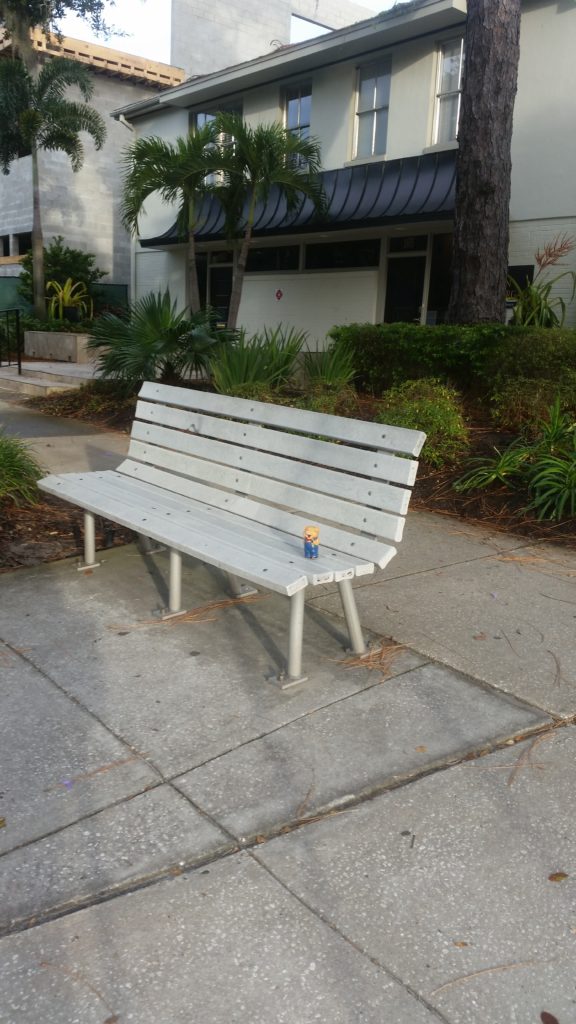
Prodigal: It is beautiful just looking at the water.
Me: I agree that is why I wanted to share about another body of water.
This is from the book In the Grip of Grace: You Can’t Fall Beyond His Love by Max Lucado
Once there were five sons who lived in a mountain castle with their fathers. The eldest was an obedient son, but his four younger brothers were rebellious. Their father had warned them of the river, but they had not listened. He had begged them to stay clear of the bank lest they be swept downstream, but the river’s lure was too strong.
Each day the four rebellious brothers ventured closer and closer until one son dared to reach in and feel the waters. “Hold by hand so I won’t fall in,” he said, and his brothers did. But when he touched the water, the current yanked him and the other three into the rapids and rolled them down the river.
Over rocks they bounced, through the channels they roared, on the swells they rode. Their cries for help were lost in the rage of the river. Though they fought to gain their balance, they were powerless against the strength of the current. After hours of struggle, they surrendered to the pull of the river. The waters finally dumped them on the bank in a strange land, in a distant country, in a barren place.
Savage people dwelt in the land. It was not safe like their home.
Cold winds chilled the land. It was not warm like their home.
Rugged mountains marked the land. It was not inviting like their home.
Though they did not know where they were, of one fact they were sure: They were not intended for this place. For a long time the four young sons lay on the bank, stunned at their fall and not knowing where to turn. After some time they gathered their courage and reentered the waters, hoping to walk upstream. But the current was too strong. They attempted to walk along the river’s edge, but the terrain was too steep. They considered climbing the mountains, but the peaks were too high. Besides, they didn’t know the way.
Finally they built a fire and sat down. “We shouldn’t have disobeyed our father,” they admitted. “We are a long way from home.”
With the passage of time the sons learned to survive in the strange land. They found nuts for food and killed animals for skins. They determined not to forget their homeland nor abandon hopes of returning. Each day they set about the task of finding food and building shelter. Each evening they built a fire and told stories of their father and older brother. All four sons longed to see them again.
Then, one night, one brother failed to come to the fire. The others found him the next morning in the valley with the savages. He was building a hut of grass and mud. “I’ve grown tired of our talks,” he told them. “What good does it do to remember? Besides, this land isn’t so bad. I will build a great house and settle here.”
“But it isn’t home, ” They objected.
“No, but it is if you don’t think of the real one.”
“But what of Father?”
“What of him? He isn’t here. He isn’t near. Am I to spend forever awaiting his arrival? I’m making new friends; I’m learning new ways. If he comes, he comes, but I’m not holding my breath.”
And so the other three left their hut-building brother and walked away. They continued to meet around the fire, speaking of home and dreaming of their return.
Some days later a second brother failed to appear at the campfire. The next morning his siblings found him on a hillside staring at the hut of his brother.
“How disgusting,” he told them as they approached. “Our brother is an utter failure. An insult to our family name. Can you imagine a more despicable deed? Building a hut and forgetting our father?”
“What he’s doing is wrong,” agreed the youngest, “but what we did was wrong as well. We disobeyed. We touched the river. We ignored our father’s warnings.”
“Well, we may have made a mistake or two, but compared to the sleaze in the hut, we are saints. Father will dismiss our sin and punish him.”
“Come,” urged his two brothers. “return to the fire with us.”
“No, I think I’ll keep an eye on our brother. Someone needs to keep a record of his wrongs to show Father.”
And so the two returned, leaving one brother building and the other judging.
The remaining two sons stayed near the fire, encouraging each other and speaking of home. Then one morning the youngest son awoke to find he was alone. He searched for his brother and found him near the river, stacking the rocks.
“It’s not use,” the rock-stacking brother explained as he worked. “Father won’t come for me. I must go to him. I offended him. I insulted him. I failed him. There is only one option. I will build a path back up the river and walk into our father’s presence. Rock upon rock I will stack until I have enough rocks to travel upstream to the castle. When he sees how hard I have worked and how diligent I have been, he will have no choice but to open the door and let me into his house.”
The last brother did not know what to say. He returned to sit by the fire, alone. One morning he heard a familiar voice behind him. “Father has sent me to bring you home.”
The youngest lifted his eyes to see the face of his oldest brother. “You have come for us!” he shouted. For a long time the two embraced.
“And your brothers!” the eldest finally asked.
“One has made a home here. Another is watching him. The third is building a path up the river.”
And so Firstborn set out to find his siblings. He went first to the thatched hut in the valley.
“Go away, stranger!” screamed the brother through the window. “You are not welcome here!”
“I have come to take you home.”
“You have not. You have come to take my mansion.”
“This is no mansion, “Firstborn countered. “This is a hut.”
“It is a mansion! The finest in the lowlands. I built it with my own hands. Now, go away. You cannot have my mansion.”
“Don’t you remember the house of your father?”
“I have no father.”
“You were born in a castle in a distant land where the air is warm and the fruit is plentiful. You disobeyed your father and ended up in this strange land. I have come to take you home.”
The brother peered through the window at Firstborn as if recognizing a face he’d remembered from a dream. But the pause was brief, for suddenly the savages in the house filled the window as well. “Go away, intruder!” they demanded. “This is not your home.”
“You are right, ” responded the firstborn son, “but neither is it his.”
The eyes of the two brothers met again. Once more the hut building brother felt a tug at his heart, but the savages had won his trust. “He just wants your mansion,” they cried. “Send him away!”
And so he did.
Firstborn sought the next brother. He didn’t have to walk far. On the hillside near the hut, within eyesight of the savages, sat the fault-finding son. When he saw Firstborn approaching, he shouted, “How good that you are here to behold the sin of our brother! Are you aware that he turned his back on the castle? Are you aware that he never speaks of home? I knew you would come. I have kept careful account of his deeds. Punish him! I will applaud your anger. He deserves it! Deal with the sins our our brother.”
Firstborn spoke softly, “We need to deal with your sins first.”
“My sins?”
“Yes, you disobeyed Father.”
The son smirked and slapped at the air. “My sins are nothing. There is the sinner,” he claimed, pointing to the hut. “Let me tell you of the savages who stay there…..”
“I’d rather you tell me about yourself.”
“Don’t worry about me. Let me show you who needs help,” he said, running toward the hut. “Come, we’ll peek in the windows. He never sees me. Let’s go together.” The son was at the hut before he noticed that the Firstborn hadn’t followed him.
Next, the eldest son walked to the river. There he found the last brother, knee-deep in the water, stacking rocks.
“Father has sent me to take you home.”
The brother never looked up. “I can’t talk now. I must work.”
“Father knows you have fallen. But he will forgive you…”
“He may,” the brother interrupted, struggling to keep his balance against the current, “but I have to get to the castle first. I must build a pathway up the river. First I will show him that I am worthy. Then I will ask for his mercy.”
“He has already given his mercy. I will carry you up the river. You will never be able to build a pathway. The river is too long. The task is too great for your hands. Father sent me to carry you home. I am stronger.”
For the first time the rock-standing brother looked up. “How dare you speak with such irreverence! My father will not simply forgive. I have sinned. I have sinned greatly! He told us to avoid the river, and we disobeyed. I am a great sinner. I need much work.”
“No, my brother, you don’t need much work. You need much grace. The distance between you and our father’s house is too great. You haven’t enough strength nor the stones to build the road. That is why our father sent me. He wants me to carry you home.”
“Are you saying I can’t do it? Are you saying I’m not strong enough? Look at my work. Look at my rocks. Already I can walk five steps!”
“But you have five million to go!”
The younger brother looked at Firstborn with anger. “I know who you are. You are the voice of evil. You are trying to seduce me from my holy work. Get behind me, you serpent!” He hurled at Firstborn the rock he was about to place in the river.
“Heretic!” screamed the path-builder. “Leave this land. You can’t stop me!” I will build this walkway and stand before my father, and he will have to forgive me. I will win his favor. I will earn his mercy.”
Firstborn shook his head. “Favor won is no favor. Mercy earned is no mercy. I implore you, let me carry you up the river.”
The response was another rock. So Firstborn turned and left.
The youngest brother was waiting near the fire when Firstborn returned.
“The others didn’t come?”
“No. One chose to indulge, the other to judge, and the third to work. None of them chose our father.”
“So they will remain here?”
The eldest brother nodded slowly. “For now.”
“And we will return to Father?” asked the brother.
“Yes.”
“Will he forgive me?”
“Would he have sent me if he wouldn’t?”
And so the younger brother climbed on the back of the of Firstborn and began the journey home.
All four brother heard the same invitation. Each had an opportunity to be carried home by the elder brother. The first said no, choosing a grass hut over this father’s house. The second said no, preferring to analyze the mistakes of his brother rather than admit his own. The third said no, thinking it wiser to make a good impression than an honest confession. And the fourth said yes, choosing gratitude over guilt.
“I’ll indulge myself,” resolves one son.
“I’ll compare myself,” opts another.
“I’ll save myself,” determines the third.
“I’ll entrust myself to you,” decides the fourth.
May I ask a vital question? As you read of the brothers, which describes your relationship to God? Have you, like the fourth son, recognized your helplessness to make the journey home alone? Do you take the extended hand of your Father? Are you caught in the grip of grace?
John 1:8
He was not that Light, but was sent to bear witness of that Light.
Jennifer Van Allen
www.theprodigalipig.com
www.faithincounseling.org


















